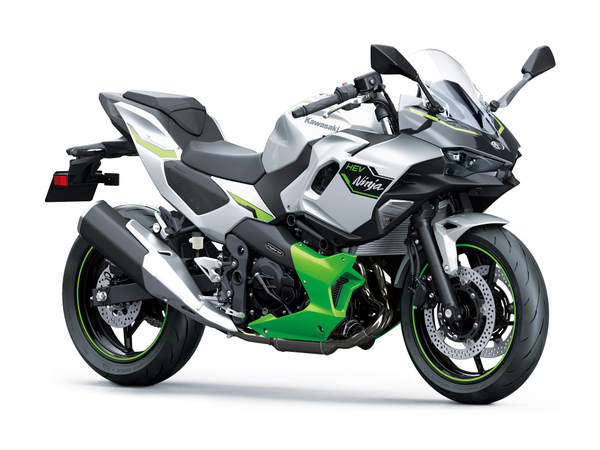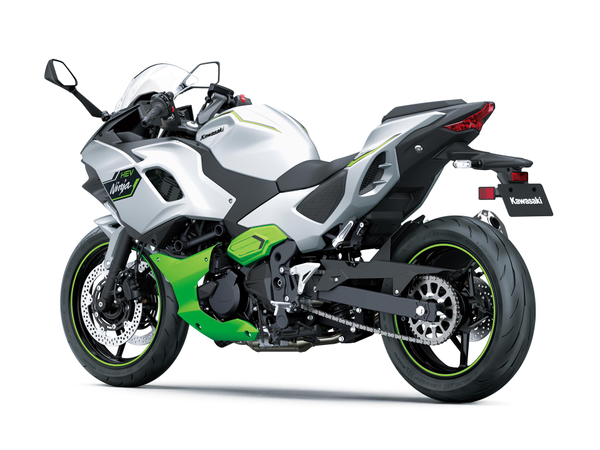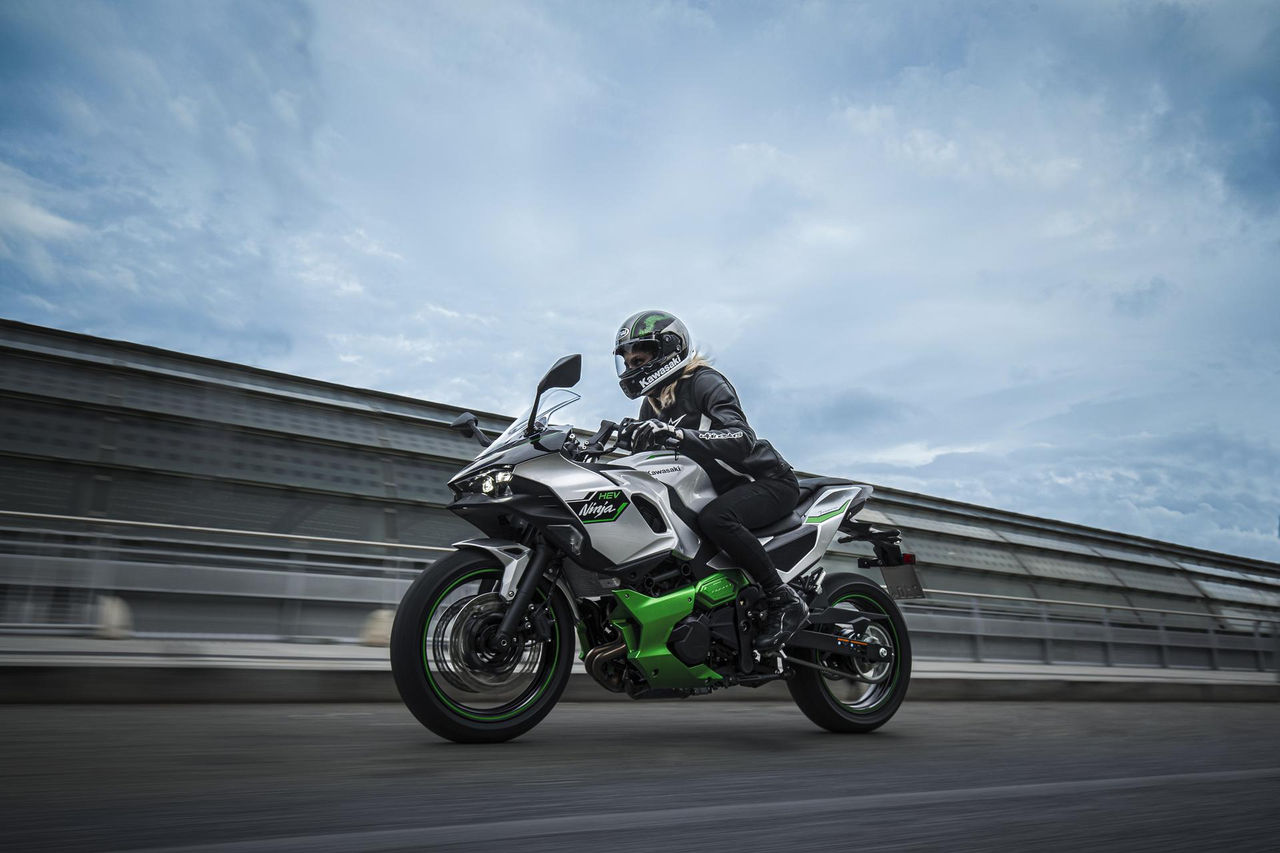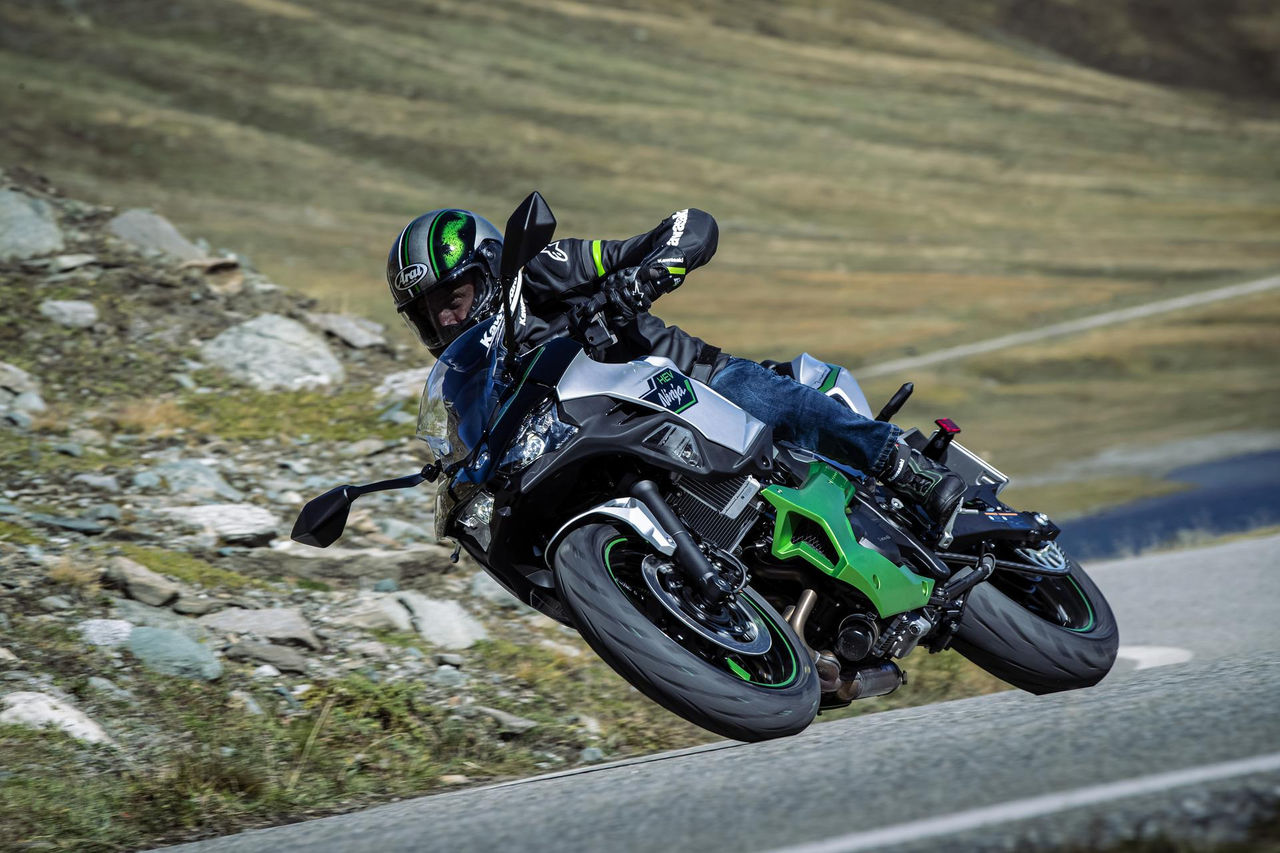Ninja 7 Hybrid
New 2024.
Ninja 7 Hybrid
The world’s first* strong hybrid** motorcycle offers riders a number of new riding experiences: a mid-size package with the instant acceleration of a 1,000cc-class supersport model from a standing start (with e-boost), fuel economy on par with the 250cc-class, and button-shift sport riding. With three different drive modes each offering a distinct riding character and numerous innovative features for riders to explore, the Ninja 7 Hybrid truly changes the game, ushering in a new era in riding experience.
* Mass production models (excluding scooters) from a major power sports manufacturer as of October 6, 2023, per Kawasaki Motors, Ltd. research.
** Strong hybrid systems combine an internal combustion engine (ICE) with an electric motor for powerful riding, and because of their large battery capacity they are able to run on electricity alone.
| Boja | Metallic Bright Silver / Metallic Matte Lime Green / Ebony |
|---|
Kawasaki Ninja 7 Hybrid
Ninja 7 Hybrid Specifications
Engine
| Engine type | Liquid-cooled, 4-stroke, parallel twin |
|---|---|
| Compression ratio | 11.7:1 |
| Valve system | DOHC, 8 valves |
| Bore x stroke | 70.0 x 58.6 mm |
| Displacement | 451 cm³ |
| Fuel system | Fuel injection: 36 mm x 2 |
| Lubrication | Forced lubrication, wet sump |
| Starting system | Integrated starter generator |
| Ignition system | Digital |
Performance & Transmission
| Maximum power | 51.1 kW {69 PS} / 10,500 rpm |
|---|---|
| Maximum torque | 60.4 N•m {6.2 kgf•m} / 2,800 rpm |
| CO2 emission ECO-HYBRID (AT) mode | 86 g/km |
| Fuel consumption ECO-HYBRID (AT) mode | 3.7 L/100 km [WMTC Class 3-2] |
| CO2 emission SPORT-HYBRID (MT) mode | 92 g/km |
| Fuel consumption SPORT-HYBRID (MT) mode | 4.0* L/100 km [WMTC Class 3-2] |
| | *Approved value from WMTC stage 3 test, class 3-2 |
| Transmission | 6-speed, return shift |
| Primary reduction ratio | 2.219 (71/32) |
| Gear ratios 1st | 2.235 (38/17) |
| Gear ratios 2nd | 1.800 (36/20) |
| Gear ratios 3rd | 1.500 (33/22) |
| Gear ratios 4th | 1.240 (31/25) |
| Gear ratios 5th | 1.074 (29/27) |
| Gear ratios 6th | 0.964 (27/28) |
| Final drive | Sealed chain |
| Final reduction ratio | 3.071 (43/14) |
Frame & Dimensions
| Frame type | Trellis, high-tensile steel |
|---|---|
| Trail | 104 mm |
| Wheel travel front | 120 mm |
| Wheel travel rear | 114 mm |
| Tyre, front | 120/70 ZR17 M/C (58W) |
| Tyre, rear | 160/60 ZR17 M/C (69W) |
| L x W x H | 2,145 x 750 x 1,135 mm |
| Steering angle L R | 30° / 30° |
| Wheel base | 1,535 mm |
| Ground clearance | 130 mm |
| Fuel capacity | 14.0 litres |
| Seat height | 795 mm |
| Curb mass | 227 kg |
Brakes & Suspension
| Front brake type | Dual discs |
|---|---|
| Front brake diameter | Ø 300 mm |
| Front brake caliper type | Dual-piston |
| Rear brake type | Single disc |
| Rear brake diameter | Ø 250 mm |
| Rear brake caliper type | Dual-piston |
| Front suspension type | Telescopic fork |
| Front suspension diameter | Ø 41 mm |
| Rear suspension type | Uni-Trak, gas-charged shock, and spring preload adjustability |
Ninja 7 Hybrid Features
3 Drive Modes: 3 Riding Experiences
Having three drive modes to choose from (SPORTHYBRID, ECO-HYBRID, and low-speed short-distance EV) offers the versatility to adapt to wide range of riding situations. Each mode’s riding character is distinct, giving riders a number of stimulating elements to explore.
6-Speed Automated Manual Transmission
Kawasaki’s unique, electronically controlled 6-speed transmission uses proprietary logic to smoothly shift gears and operate the clutch. With actuation of the gears and the hydraulic clutch carried out by the bike, the rider can focus on throttle control.
Unique “Strong Hybrid†” Power Unit: 451 cm3 Parallel-Twin ICE + Traction Motor
With a compact traction motor mounted behind the cylinder bank of a 451 cm3 Parallel Twin internal combustion engine, the strong hybrid power unit is the first of its kind in a motorcycle. Working together, the ICE and traction motor complement each other to produce a rider-friendly character with strong low mid torque. * Strong hybrid systems combine an internal combustion engine (ICE) with an electric motor for powerful riding, and because of their large battery capacity they are able to run on electricity alone.The Ninja 7 Hybrid’s EV Mode may be helpful for certain situations where quiet riding is appropriate, such as in residential areas or in parking garages. Speed and range are limited.
World’s First Mass Produced Strong Hybrid Motorcycle
Until now many vehicles with ICE and EV power have not been able to operate independently; either only EV or only ICE. Kawasaki’s strong hybrid technology means the motorcycle can be operated as EV only, ICE only or a combination of the two.
e-boost: Increased Performance & Litrebike-Level Acceleration
Depending on the drive mode, riders can experience full automatic (EV Mode), manual button-shift (SPORTHYBRID), or rider’s preference (ECO-HYBRID).
Zero Emissions, Quiet Running
Until now many vehicles with ICE and EV power have not been able to operate independently; either only EV or only ICE. Kawasaki’s strong hybrid technology means the motorcycle can be operated as EV only, ICE only or a combination of the two.
Integrated ICE And EV Power Train
The packaging of the power train is very efficient. The new 451cc engine has been adapted to offer either fully automatic or manually selectable gears while the EV motor (which is water-cooled) sits behind the twin cylinders of the ICE motor creating a compact overall package aiding weight distribution.
All Electric Riding Operation
For zero emission zones EV-only operation is possible. As the charge of the lithium-Ion battery is near depleted the ICE motor is able to cut in and generate electric current to charge the battery pack.
Kawasaki Rideology for HEV App
A new version of Rideology the App will be introduced for the Kawasaki Hybrid. The information available will focus on general information already used in Rideology for other machines as well as updates and insights unique to the operation of an HEV.
Combined EV and ICE Operation
Depending on the mode selected, the machine will pull away using only EV power and switch to ICE as the speed rises – this is automatic and requires no rider intervention.
Full Automatic or Manual Button-Shift
Depending on the drive mode, riders can experience full automatic (EV Mode), manual button-shift (SPORTHYBRID), or rider’s preference (ECO-HYBRID).
Idling Stop Function
In ECO-HYBRID mode when the vehicle comes to a complete stop, the engine turns off to conserve fuel.
Carefully Considered Chassis Design: Sporty Kawasaki Handling
Orthodox sport motorcycle chassis design thinking was used to carefully arrange all the components of the hybrid power unit (ICE, traction motor, battery pack, ISG) in a lightweight trellis frame to achieve the light, nimble handling that Kawasaki sport motorcycles are known for.
ALPF (Automatic Launch Position Finder)
When the vehicle stops during MT operation, the transmission is automatically returned to 1st gear to facilitate moving off again. The system may also be turned off.
Futuristic Colour Selection
Silver and Lime Green with a semi-matte finish, the Ninja 7 Hybrid’s colour & graphics contribute a fresh, futuristic image for Kawasaki’s HEV models.
Freedom to Ride: No Regular Battery Charging Necessary
Because the battery does not need to be charged regularly—it is charged while riding—this allows the rider to focus on the ride ahead.
TFT Full-Colour Instrumentation with Smartphone Connectivity
4.3” all-digital TFT colour instrumentation gives the cockpit a high-tech, high-grade appearance, while being able to connect to the bike wirelessly offers an enhanced motorcycling experience.
All-LED Lighting
From head to tail, all-LED lighting contributes to a modern appearance and sleek, futuristic styling.
WALK Mode (with Reverse)
This convenient mode assists with manoeuvring in a parking lot. When engaged, opening the throttle moves the bike forward at walking speed. Closing the throttle past the “zero” point moves the bike in reverse.
Rider-Friendly Interface
From the relaxed, sporty riding position that caters to a wide range of riders, to the attentive layout of the switchgear, all aspects of the Ninja 7 Hybrid’s rider interface were designed to be intuitive and confidence inspiring.
250cc-Class Fuel Economy
Thanks to the contribution of its traction motor, the Ninja 7 Hybrid’s fuel economy is superior to even that of Kawasaki’s own Ninja 250.












